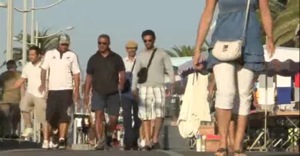
- 87'
- Authors : Elise Richard, François-Xavier Dupouy
- 31-08-2011
- Master : 2013
-
Share!
The Secrets of the Summer Markets | M6 | Zone Interdite
Every week during the summer, 13,000 markets bring life to the towns of France. A meeting place for strollers and passing tourists, these centres of conviviality and bargains can also be a market for dupes: fake regional products, swindling and counterfeit goods. Who are these traveling salesmen who present their patter? Amidst a sense of solidarity, but also the law of the jungle, we investigated the hidden face of the summer markets.
Floriane, 29 and a mother, sells clothing and accessories for little dogs on the Côte d’Azur. Full of energy and enthusiasm, she quickly becomes disillusioned. Despite all her efforts she realises that doing the markets can be a thankless and unrewarding task.
Valentin, 19, wants to earn a living peddling his wares at the markets of the Loire Atlantique. Thanks to his gift of the gab he hopes to sell his gadgets: making broomsticks, ten-bladed scissors and fly swatters. We shared his moments of elation and depression.
Vito, 46, is responsible for the stands in the market at Frejus. A former soldier, he’s the man who allots the positions each morning and settles disputes between traders. He guides us through the rules and behind the scenes of the markets of Provence.
There’s often a fight for places between the traders because, depending on your position, your takings can be as much as four-fold! So certain traders offer generous tips to the allotters. On condition of remaining anonymous, they agreed to talk of these widespread, but totally illegal, practices.
We also investigated the swindles perpetrated by some traveling traders, who take advantage of the innocence of tourists to line their pockets. So watch out for those “fake” regional products, like the Spanish olive oil that sells at four times the price of olive oil from Provence! And the cheese from ewe’s milk or from Savoy, sold at 35 and 50 Euros the kilo on the markets of Dordogne when it was purchased cheaply from a wholesaler! Any method is good to cheat the consumer: deceptive labels, Provencal wrapping, lying patter, etc.
